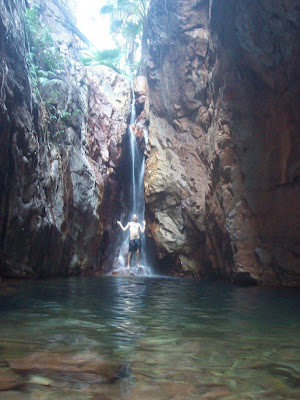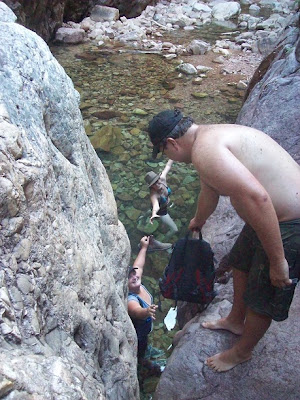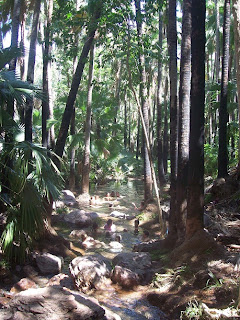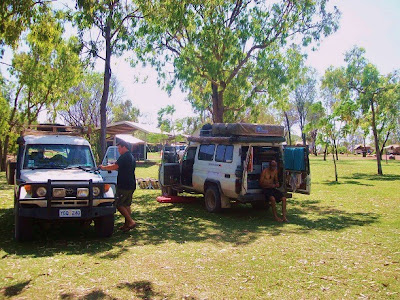The Gibb River Road is known as the most rugged and corrugated road in Australia, notoriously known for breaking axles, blowing tyres, and vibrating out any lose nut or bolt. Only opened for 7 months of the year because of the sheer amount of water during the wet season this road still tests the best drivers during the dry; several river crossings up to the bonnet, uncountable creek crossings, and temperatures still high to test the car radiator. So with that in mind, we hoped that our 23year old car would hold up to the constant corrugations and sharp rocks, we jumped right in.
Tim and Nat, our friends from Tasmania were here to join us on this stretch of road. Out in this country it’s logical to travel with another and simply practise good convoy behaviour. Our new mudstar 33inch tyres should work a gem on these roads and with a lowered pressure of 26psi plus the theory of all our bolts literally rusted in we hoped for the best. Once we left the bitumen it was straight into the corrugations; nope, no gradual introduction to this road. This was the beginning of 588km track full of vacuuming red dust and persistent dogging of anything ‘puncture’ worthy.
 |
| Quality Control Inspector Nat |
Our first stop was the well known EL Questro Conservation Area. This expensive little outing can cost up to $108 to visit 4 gorges, swim in a thermal spring, drive within the conservation area, and camp there for one night. But with some ingenious planning we cut that down dramatically (I’ll leave it at that). Every gorge was able to offer something different. Our favourite was the highlighted El Questro Gorge which did require a decent 8 km walk with plenty of water crossings. We literally had to get into hip high water and convoy our gear over to the other side while rock climbing over waterfalls. It was an adventurous walk and with the gorge all to ourselves it that truly made it worthwhile it at the end.
 |
| Sexy hiking gear there Jess |
Another holiday maker was at Zebedee springs which made for a very relaxing morning. Laying back with a view of red rusted cliffs, palm trees surrounding the pools, and a very comfortable 32 degrees, things sometime couldn’t be better.
Continuing back on the Gibb, we’d been told about this Pentecost River. Making it name famous for puncturing tyres and even in some cases drowning cars. We’d heard one guy doing two back tyres in one 150 metre crossing while we were there, and even seeing one troopcarrier almost becoming water logged after changing gears while in the water. These stories have made this crossing not the river itself. Drivers and there stupidity gets them into these situations. Taking it slow, right tyre pressure, and practising Low4 through river crossings could have easily prevented these bad scenarios from happening. So with Tim and Nat we slowly creped through in Low4 second gear without one problem what so ever.
Taking this road slowly averaging about 50km/h we had plenty of people overtaking us and even had the pleasure at seeing one of them a few km’s up the road with a flat tyre. Sigh, someday they will learn. That afternoon we randomly pulled into the Home Valley Station not expecting much of an invitation or accommodation. However, beauty comes from within. Arriving through beautiful stone walls we first noticed the awesome green grass. Dealing with constant dust the sight of green luscious grass made me want to be a dog. Sounds weird, but just thinking about rolling around feeling happy on the grass was enough to justify the $32 unpowered that night.
 There were 2 massive pools, a stylish but rustic bar with cheap beers and yummy tasting food, and the Pentecost River nearby for Dave and Tim to go fishing. It was a beautiful place to spend the afternoon lying around the pool in the middle of nowhere.
There were 2 massive pools, a stylish but rustic bar with cheap beers and yummy tasting food, and the Pentecost River nearby for Dave and Tim to go fishing. It was a beautiful place to spend the afternoon lying around the pool in the middle of nowhere. Tim and Dave’s fishing expedition was classic; returning with nothing but mud all over their clothes and up to their knees. Sometimes I wonder about the effort in catching fish. Fishing alongside salt water crocodiles is not my cup of tea.
 |
| Pat Callaghan: 4X4 show on ONE HD (randomly at Home Valley Station) |








No comments:
Post a Comment
Thankyou for Posting a Comment: